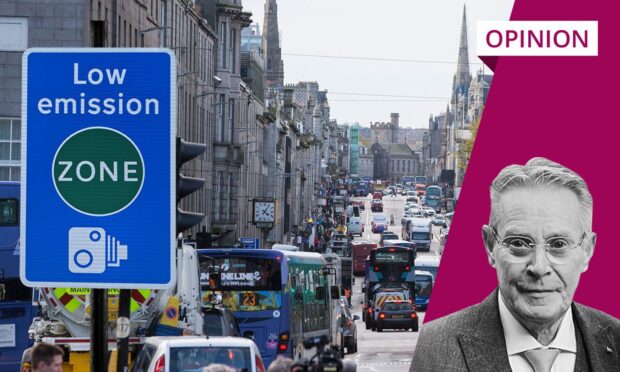You’ve got to admire council statisticians who parked their own coach in the middle of Aberdeen’s much-reviled bus gates/LEZ crystal maze of confusion.
Stats began tumbling out faster than the fines being aimed at drivers trapped in the gates or low emission zone (LEZ).
After weeks of anxious anticipation, the waiting was over.
Details about the specific impact of the LEZ on drivers, since its rollout at the start of June, were finally issued by Aberdeen City Council.
We already knew bus gates launched last year were raking in millions in fines since they were imposed on the Aberdeen public after the council by-passed normal democratic consultation processes.
Like Nat King Cole (among other artists) in “Let’s Face the Music and Dance”, the council was anticipating that “there may be trouble ahead” over LEZ figures, too.
Funnily enough, the famous old show song was used in an insurance advert on tv a few years ago, but I don’t think we can protect ourselves against fines – however unfair and unjust they might be.
The council, however, was attempting to insure itself from inevitable criticism after it was revealed that the number of initial LEZ fines in the city were higher than comparable schemes already launched in Edinburgh, Glasgow and Dundee.
It was the kind of statistic which stuck out above all else and would be remembered, whereas any number of excuses were usually soon forgotten.
It needed explaining; the council was raring to go.
Stats played down Aberdeen LEZ’s first few weeks
Statistics to play down Aberdeen LEZ’s brutal first few weeks poured forth.
They’d thought of everything: Dundee was smaller, Edinburgh did things differently, Glasgow was the first, so got more attention.
Well, almost everything.
They could have mentioned that the Euros was on the big screen, that it was four weeks after Easter and three before Pentecost – and that there was a “blue moon” on its way to us.
But you have to hand it to them: they were pretty thorough.
But maybe too thorough; the recent history of Aberdeen’s traffic farce has simply fed suspicion about the council’s intentions.
Statistics which look perfect must always be treated with care.
Look at our recent experience with Covid and winter energy benefits cuts for all struggling pensioners above those just on pension credit.
And the Scottish Government’s carefully-rehearsed refusal to accept blame for horrific budget cuts.
They haven’t stopped criticism of a “woeful” LEZ launch process, as one leading MSP opponent claimed.
The Glasgow defence seemed daft: all that mattered was that it was the first in Aberdeen and they had to get it right – particularly after the lessons which should have been learned from the dreadful bus-gate shambles.
Businesses looked on in horror at the bus gates fiasco
Businesses looked on in horror at the gates fiasco damaging trade, so it was little wonder people were equally suspicious about the LEZ coming hard on the heels of that.
In response to these business campaigners, the council offered them a feeble forum twice a year “to discuss concerns”.
A bit of an insult and what looked like a cynical attempt to park the issue in a forgotten layby where the tumbleweed blows.
Perhaps we should take a leaf from SNP deputy leader Keith Brown at the party conference.
I thought he was suffering from altitude sickness after too many trips up the mythical Sugarcandy Mountain, where cakes and other goodies are free and grow on trees.
He spoke of a greater force in the universe which would transcend normal procedural constraints on independence: in other words, the voice of people.
Brown was brought back to earth by John Swinney who said stop obsessing about independence and deliver on domestic issues instead (it’s taken nearly two decades for that penny to drop).
And Stephen Flynn, who spoke of “self-inflicted wounds”.
Can you imagine the reaction of the SNP in Aberdeen City Council’s controlling coalition if the public decided to follow Brown’s example.
And announced, “Acting with a higher authority invested in us we are scrapping the bus gates and LEZ with immediate effect.”
No, they have to wait for the next council elections to enact retribution.
People just want to feel good for a change and see public money helping them in everyday life.
They feel squeezed by more and more council and government restrictions.
Starmer, the other chap who spent too much time on Sugarcandy Mountain, is doing the same after enforcing something a lot different to his election campaign.
It wouldn’t be so bad if people could see the council spending its treasure chest of bus-gate “taxes” on something which directly affected our daily lives clearly and positively; an instant feel-good factor.
Instead we hear vague references to the money funding infrastructure projects and “improving air quality”.
You can forgive ordinary people for suspecting the money will disappear in a puff of air; now you see it, now you don’t.
David Knight is the long-serving former deputy editor of The Press and Journal

Conversation